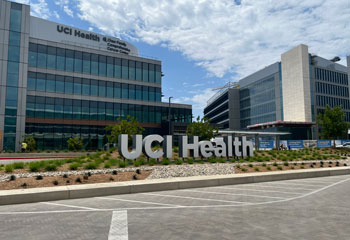
Cancer Care
Our cancer centers combine the most advanced cancer treatments with personalized care, focused on your physical, social and emotional needs.
Featured cancer services

Blood cancer care

Breast cancer care

Prostate cancer care
Our approach to cancer care
A cancer diagnosis can turn your world upside down. But at UCI Health, your care team will guide you through each step with unmatched expertise and compassion.
This starts with making sure you have an expert care team in your corner. At our Chao Family Comprehensive Cancer Center, your clinicians are all specialists in the specific cancer you have. This ensures that you’re getting the latest, most effective treatments — from experts who will help you understand what to expect.
Your specialized care team will work with you to tailor your cancer treatment — anticipating both your physical and emotional needs.
To do this, they’ll discuss:
- Your personal and family history
- The type, stage and genetic profile of the cancer
- Your concerns, preferences and goals for treatment
- Your social and emotional support system
See a cancer specialist quickly
We also know that when you have or suspect you have cancer, every minute of waiting can be stressful. That’s why we can typically get you in for an appointment within a few days. And we even offer same-day appointments if you’re a new patient.
Second opinions
A second opinion can help you face your diagnosis with the confidence and information you need to start treatment. We offer second opinions to allow you to explore all your options.
Why choose UCI Health for cancer care?
Cancer care close to home
We make it as easy as possible for you to get the cancer care you need, when and where you need it. We have cancer centers in Costa Mesa, Irvine, Laguna Hills, Orange and Yorba Linda. These convenient cancer care locations throughout Orange County offer you the chance to get care as close to your home as possible.
Nurse navigator by your side
At one of your first appointments, you'll meet your nurse navigator who will support you before, during and after treatment. Your nurse navigator helps you with everything from coordinating appointments to addressing cancer treatment side effects. This allows you to focus on your health and recovery, while we focus on anticipating and addressing your needs.
Focusing on your quality of life
At UCI Health, we make your quality of life a top priority throughout cancer treatment. Our highly specialized team of supportive care specialists help address your physical, social and emotional needs. You'll have access to dietitians, financial counselors, social workers, integrative medicine specialists, sexual medicine specialists and others.
Our Integrative Oncology program, in partnership with the Susan Samueli Integrative Health Institute, provides holistic therapies as you undergo cancer treatment.
Leader in research and clinical trials
As the only NCI-designated cancer center in Orange County, we offer one of the largest clinical trial programs in the region. These trials look at new ways to treat a wide range of both common and rare cancers. This gives you access to treatments and techniques that are not yet widely available.
Nationally recognized cancer care
Our goal is to provide you with the best possible cancer care. For us, that means bringing together expert teams, advanced treatments and technologies, supportive care and research — all focused on you. This approach is why U.S. News & World Report, the American Society of Clinical Oncology and others recognize us for excellence.
We have also been named a Blue Distinction Center for Complex and Rare Cancers, meaning that we treat types of cancer others can't.

No cancer is rare to us
As the only NCI-designated comprehensive cancer center in Orange County, we diagnose and treat all kinds of cancer.
Schedule an appointment with one of our world-class oncologists today. Call 714-456-8000, or

Find a cancer clinical trial
Talk to your doctor to see if a cancer clinical trial is right for you.

Michelle Helm, Lung Cancer Survivor
“Before I got to UCI Health, I was feeling lost and frustrated. Nobody was listening to me. I felt that nobody was on my team … Once I got to UCI Health, I felt like I was on a bullet train of hope.”
Featured News Stories
UCI Health Physician Network expands with Cancer & Blood Specialty Clinic as new affiliate

Thousands take the Anti-Cancer Challenge, raising over $1 million for critical research
A record number of people joined the ninth annual Anti-Cancer Challenge to ride, run and walk to support cancer research.

UCI Health cancer center among the nation’s best
Featured Blog Posts

Medical mission brings advanced radiation therapy to fight cervical cancer in Ethiopia
UCI Health radiation oncologist Dr. Priya Mitra trained local medical staff in the lifesaving treatment.

Lung cancer screening is essential for early detection, treatment
UCI Health is offering a new clinical trial to expand screening to relatives of certain lung cancer patients.





